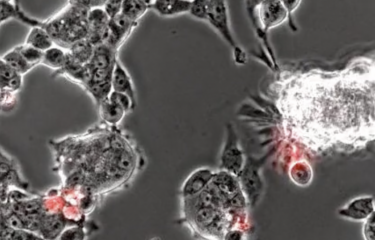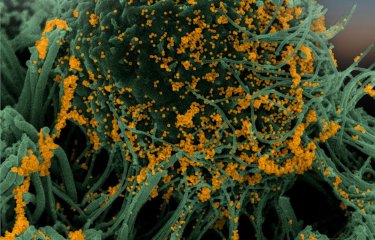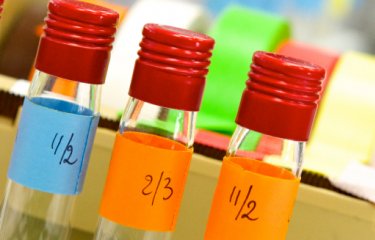The Covid-19 epidemic has had great impact on people’s lives across the world. The disease, physical distancing and lockdown measures have had multiple effects on health. One less-studied effect is the consequence on the microbiome. A group of prominent microbiome researchers in biomedical and social science, coordinated by Brett Finlay (University of British Columbia) and Tamara Giles-Vernick (Institut Pasteur, Paris), have explored in an article the potential consequences of the pandemic and have raised questions for further collaborative research between biologists and social scientists.
Multiple micro-organisms (bacteria, viruses, fungi…) inhabit the human body, forming our microbiome. This microbiome is fundamental to our health, and its diversity has been declining for decades because of our urban way of life, antibiotic use and excessive hygiene. The Covid-19 pandemic might be furthering this decline. A group of researchers explored this phenomenon in an article. Their work was advanced through meetings of the CIFAR's Humans & the microbiome program. The CIFAR is a global research organization.
The Covid-19 pandemic may facilitate overall microbial loss
“The Covid-19 pandemic may have a substantial and uneven effect across the globe on the microbes on which humankind depends. Current pandemic control measures and practices, from physical distancing to extensive hygiene, may have long term effects; they can potentially facilitate overall microbial loss and make it difficult for people to replace this lost and much-needed diversity,” explains Tamara Giles-Vernick, head of the Anthropology and Ecology of Disease Emergence unit at the Institut Pasteur (Paris). Multiple factors in the Covid-19 pandemic may further the loss of microbiome diversity.
The virus itself may directly affect the microbiome, especially in the guts and airways. Moreover, patients suffering from severe Covid-19 cases may receive high-dose antibiotics, which may further affect their microbiome.
Although necessary, measures to prevent the spread of the virus may affect the microbiome
Covid-19 does not just affect those infected with the virus. Measures to control pandemic transmission affects societies as a whole, although in uneven ways. For instance, frequent hand washing, and in some cases, regular sanitation of public and private places with bleach or disinfectant, are measures recommended to control transmission. Hygienic measures are crucial for controlling transmission, but may also affect the microbiome in diverse ways. Lockdown measures, especially for those who decrease their physical activities and consume more unhealthy foods, may reduce microbial diversity, whereas for others, cooking at home has been linked to declining consumption of processed foods and can positively affect the microbiome. Finally, social interactions, which make contribution to gut microbiome composition, have been limited to prevent the spread of the pandemic, with potential consequences for very young and elderly populations. Such consequences may be especially pronounced in societies where the elderly do not live with younger generations.
The researchers also argue that the pandemic offers a unique opportunity to study the relationship between the microbiome, the SARS-CoV-2 virus, and social and economic conditions and changes. This knowledge may prove key in the prevention, treatment, and the long-term biological and social consequences of this pandemic and future ones.
Source:
The hygiene hypothesis, the COVID pandemic and consequences for the human microbiome, PNAS, January 20, 2021
B. Brett Finlay1,2, Katherine R. Amato2,3, Meghan Azad2,4, Martin J. Blaser2,5 Thomas C.G. Bosch 2,6, Huitung Chu2,7, Maria Gloria Dominguez-Bello2,8, Stanislav Dusko Ehrlich2,9, Eran Elinav2,10, Naama Geva-Zatorsky2, 11, Philippe Gros2,12, Karen Guillemin2, 13, Frédéric Keck2,14,15, Tal Korem2,16, Margaret J. McFall-Ngai2,17, Melissa K. Melby2,18, Mark Nichter2,19, Sven Pettersson2, 20, Hendrik Poinar2, 21, Tobias Rees2,22, Carolina Tropini 2,23, 24, Liping Zhao2,8, Tamara Giles-Vernick2, 25
1 Michael Smith Laboratories, University of British Columbia, #301-2185 East Mall, Vancouver, B.C. Canada V6T 1Z4
2 Humans and the Microbiome Program, CIFAR, 661 University Ave, Toronto, ON Canada M5G 1M1
3 Department of Anthropology, Northwestern University, Evanston, IL 60208 USA
4 Manitoba Interdisciplinary Lactation Centre (MILC), Children's Hospital Research Institute of Manitoba, 715 McDermot Ave, Winnipeg, MB Canada R3E 3P4
5 Center for Advanced Biotechnology and Medicine at Rutgers Biomedical and Health
Sciences, Rutgers University, 679 Hoes Lane West, Piscataway, New Jersey 08854-8021 USA
6 Zoologisches Institut, University of Kiel, Christian-Albrechts-Platz 4, 24118 Kiel, Germany
7 Department of Pathology, University of California San Diego, La Jolla, CA USA
8 Department of Biochemistry and Microbiology, Rutgers University, 71 Lipman Dr, New Brunswick, NJ 08901 USA
9 INRA, 78350 Jouy-en-Josas, France
10 Weizmann Institute of Science, Wolfson Bldg., Rehovot, 761000 Israel and Cancer- Microbiome Division Deutsches Krebsforschungszentrum (DKFZ), Neuenheimer Feld 280, 69120 Heidelberg, Germany
11 Technion Integrated Cancer Center; Department of Cell Biology and Cancer Science,
Technion- Israel Institute of Technology, 1 Efron St., 12th Floor, Haifa, Bat Galim, 3525433 Israel
12 Department of Biochemistry, McGill University, McIntyre Medical Building, 3655 Promenade Sir William Osler, Montreal, Quebec H3G 1Y6 Canada
13 Institute of Molecular Biology, University of Oregon, 1318 Franklin Blvd., Eugene, OR 97403 USA
14 Centre National de la Recherche Scientifique, 3 Rue Michel Ange, 75016 Paris, France
15 Laboratoire d’Anthropologie Sociale, Collège de France, 3 rue d'Ulm, 75005 Paris, France
16 Department of Systems Biology; Department of Obstetrics and Gynecology; Columbia University, Irving Cancer Research Center 1130 St. Nicholas Avenue, New York, NY 10032 USA
17 Pacific Biosciences Research Center, University of Hawai’i at Manoa, 1993 East-West Road, Honolulu, HI 96822 USA
18 Department of Anthropology, University of Delaware, Newark, DE 19711 USA
19 Department of Anthropology, University of Arizona, Emil W. Haury Anthropology Bldg, 1009 E South Campus Dr, Tucson, AZ 85721 USA
20 Nanyang Technological University, 20 Nanyang Green, Singapore 637715
21 Department of Anthropology, McMaster University, Chester New Hall, Hamilton, Ontario, Canada L8S 4M4
22 Berggruen Institute, 304 S. Broadway, Los Angeles, CA 90013 USA
23 School of Biomedical Engineering, University of British Columbia, 251 - 2222 Health Sciences Mall, Vancouver, BC Canada V6T 1Z3
24 Department of Microbiology & Immunology, University of British Columbia, 1365 – 2350 Health Sciences Mall, Vancouver, British Columbia Canada V6T 1Z3
25 Anthropology & Ecology of Disease Emergence, Institut Pasteur, 25-28 rue du Docteur Roux 75015 Paris, France
This study is part of the priority scientific area Emerging infectious diseases of the Institut Pasteur's strategic plan for 2019-2023.





